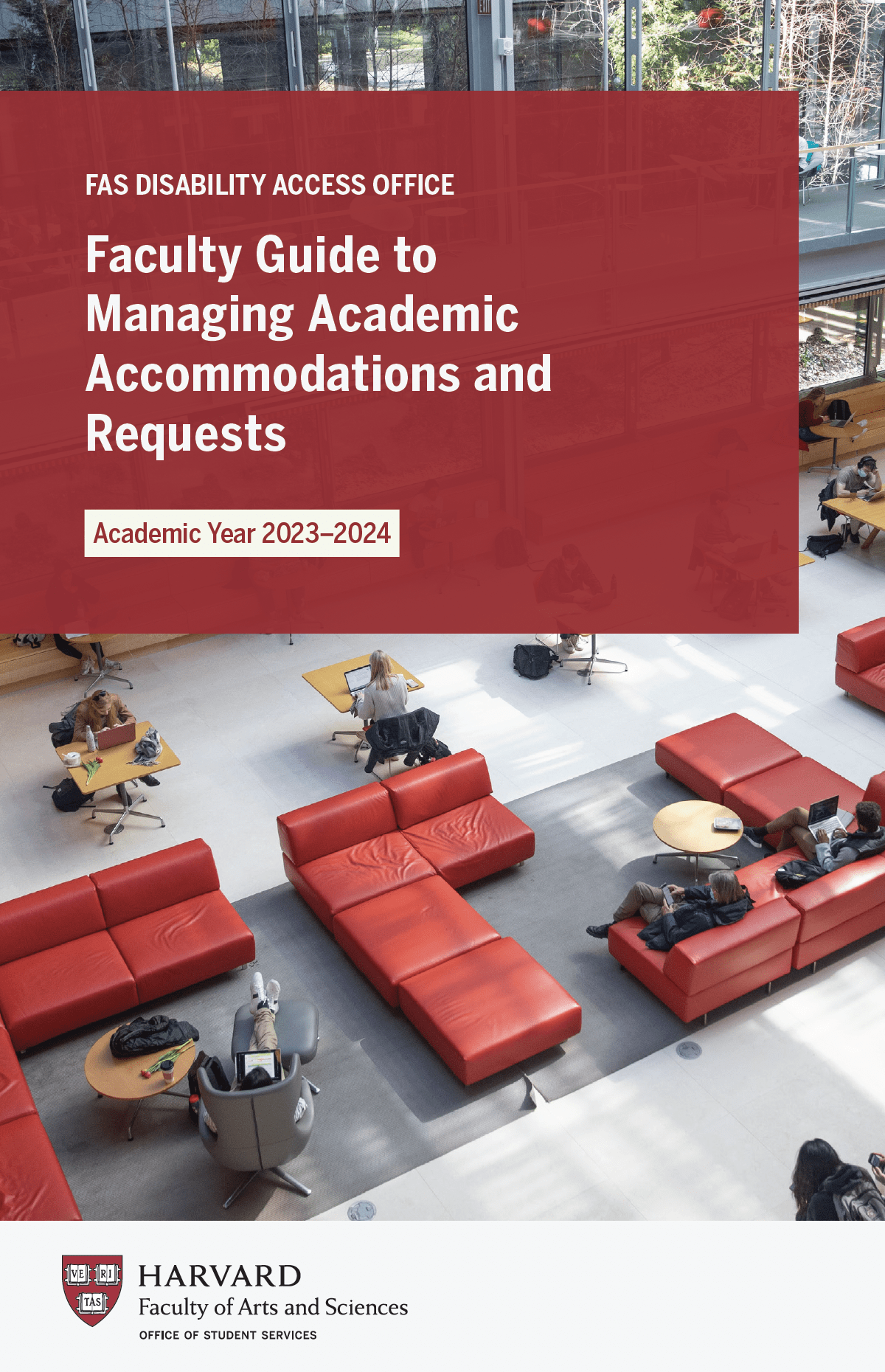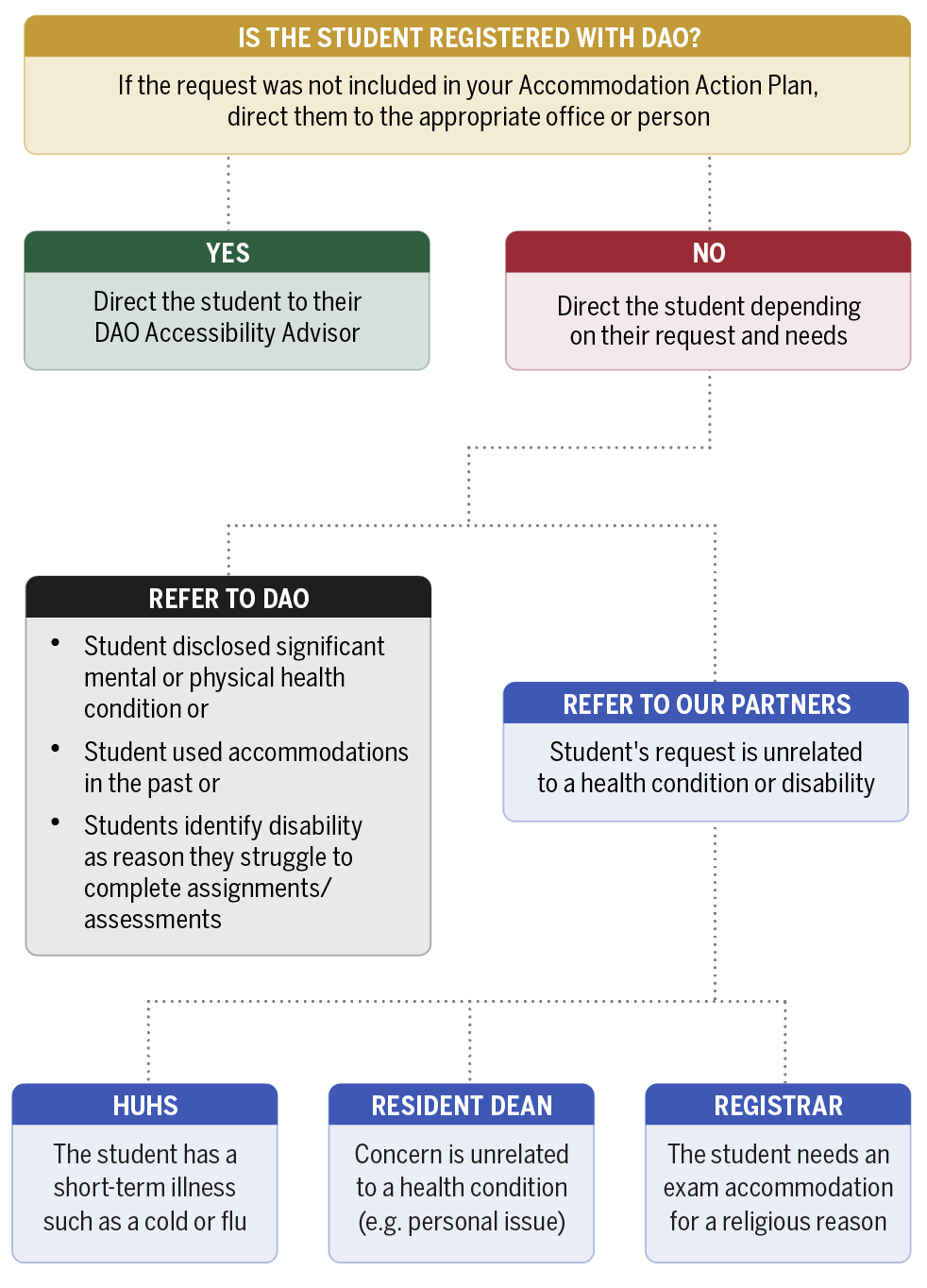Faculty Guide to Managing Academic Accommodations and Requests: Academic Year 2023-2024
Table of Contents
- About this Guide
- Accommodation Syllabus Statement
- Responding to Requests
- Implementing Common DAO Accommodations
- Resources
Please contact the Disability Access Office at dao@fas.harvard.edu to request printed copies of this guide.
About this Guide
Faculty implement and facilitate academic accommodations determined
by the Disability Access Office (DAO) and are critical partners in the accommodation process.
This guide covers how to:
- Manage academic accommodation requests for students in FAS courses
- Implement common academic accommodations approved by DAO
If you have any questions about the topics covered in this guide, please
contact us.
- Email: dao@fas.harvard.edu
- Phone: (617) 496-8707
- Address: 1350 Massachusetts Avenue, Suite 450, Cambridge, MA 02138
Accommodation Syllabus Statement
Adding the following text to your syllabus will help ensure students with disabilities feel welcome in your course and know the correct channel for requesting accommodation.
ACTION ITEM: Please add the following to your course syllabus
Harvard University values inclusive excellence and providing equal educational opportunities for all students. Our goal is to remove barriers for disabled students related to inaccessible elements of instruction or design in this course. If reasonable accommodations are necessary to provide access, please contact the Disability Access Office (DAO). Accommodations do not alter fundamental requirements of the course and are not retroactive. Students should request accommodations as early as possible, since they may take time to implement. Students should notify DAO at any time during the semester if adjustments to their communicated accommodation plan are needed.
Responding to Requests
Official Requests
You will receive official accommodation requests from DAO via email.
After receiving approved accommodations from DAO, students must log in to the Accessible Information Management portal (AIM) and select approved accommodations for each class. Once your student completes this process, you will receive an Accommodation Action Plan via email listing the accommodations requested for your course.
Timing: Most Accommodation Action Plans are sent during the first few weeks of classes, but you can receive them any time throughout the semester. In accordance with ADA and Section 504 law, you cannot set a cut-off date for accommodation implementation. Students can request new accommodations or changes to existing accommodations, and accommodations are not retroactive.
ACTION ITEM: After receiving your Accommodation Action Plan, complete the steps needed to implement the accommodation. Review implementation responsibilities for common DAO accommodations.
Unofficial Requests
Only provide the approved accommodations outlined in your Accommodation Action Plan from DAO.
Unofficial accommodations, although often well intentioned, risk compromising academic integrity and/or prevent students from connecting with necessary supports. For equity reasons, all accommodations should be determined and communicated to you by the DAO.
IMPORTANT: Do not provide unofficial accommodations. DAO should determine and communicate all approved accommodations.
TIP: Use the decision tree to redirect unofficial requests so that students can receive approved accommodations.
Decision Tree for Unofficial Requests
- Is the student registered with DAO? If the request was not included in your Accommodation Action Plan, direct them to the appropriate office or person.
- If yes, direct the student to their DAO Accessibility Advisor
- If no, proceed to step 2
- Refer to DAO if the student:
- Disclosed a significant mental or physical health condition or
- Used accommodations in the past or
- Identifies disability as reason they struggle to complete assignments/assessments
- If none of the above, proceed to step 3
- Refer to our partners
- Refer to HUHS if the student has a short-term illness such as a cold or flu
- Refer to the Resident Dean if the student’s concern is unrelated to a health condition (e.g. personal issue)
- Refer to the Registrar if the student needs an exam accommodation for a religious reason
Decision Tree Infographic: This infographic illustrates the outlined decision tree for unofficial requests. Download the full size infographic image.
- Is the student registered with DAO? If the request was not included in your Accommodation Action Plan, direct them to the appropriate office or person
- If yes, direct the student to their DAO Accessibility Advisor
- If no, proceed to step 2
- Direct the student depending on their request and needs
- Refer to DAO if the student:
- Disclosed a significant mental or physical health condition or
- Used accommodations in the past or
- Identifies disability as reason they struggle to complete assignments/assessments
- If none of the above, proceed to step 3
- Refer to DAO if the student:
- Refer to our partners
- Refer to HUHS if the student has a short-term illness such as a cold or flu
- Refer to the Resident Dean if the student’s concern is unrelated to a health condition (e.g. personal issue)
- Refer to the Registrar if the student needs an exam accommodation for a religious reason
Implementing Common DAO Accommodations
Faculty Responsibilities
DAO recognizes that all courses have different learning objectives and formats. We rely on faculty to identify essential course requirements, and we will work with you and the student when navigating accommodations for your course.
STEP 1: Review Accommodation Action Plan
- Review all information on each student’s Accommodation Action Plan. Note that all plans are unique and some require additional steps.
- If your student’s approved accommodation does not seem aligned with your course requirement, contact DAO before connecting with the student. We can provide further clarification and, if needed, identify a mutually acceptable solution
STEP 2: Meet privately with your student to discuss their accommodations in the context of your course.
- During your conversation, ask how you can support your student’s learning and accommodation needs. Be mindful that students may not feel comfortable sharing health information and/or a diagnosis with you and they are not required to do so.
- Examples of ways you can rephrase questions without asking for health information are included below.
| Instead of saying… | Try the phrase… |
|---|---|
| How severe is your hearing loss? | What types of environments or class discussions may be inaccessible for you? |
| Do you have class participation accommodations because you are autistic? | How is class participation most accessible for you? |
| Why can’t you hand-write notes? | Let’s discuss how you will use technology in class for your note-taking accommodations. |
| You can tell me more about your disability after class. | Let’s discuss how we will implement your accommodations during office hours. |
STEP 3: Begin implementing approved accommodations.
- Your Accommodation Action Plan will specify which accommodations require a documented arrangement or coordination by you.
- The Common DAO Accommodations section outlines what is needed to implement common accommodations. This is not an exhaustive list of all possible DAO-approved accommodations. More information about accommodations is available at dao.fas.harvard.edu/services-overview/academic.
Common DAO Accommodations
- Audio Recording/Note-Taking
- Test-Taking
- Breaks During Class
- Alternative Formats
- Materials/Slides Provided in Advance
- Service Animals
- Deadline and Attendance Adjustment (DAA)
- Alternative Participation
- Use of a Cue Sheet/Memory Aid
- Temporary Injuries/Illness
- Communication Partner/Personal Care Assistant
Audio Recording/Note-Taking
Implementation responsibilities:
FACULTY
No further action is needed to implement this accommodation
DAO
We will coordinate and notify you if your student is using note-taking technology or a peer note-taker.
What faculty need to know:
- Students typically use DAO-approved note-taking apps that include audio recording and transcription. You may ask students to turn off recording apps/devices during sensitive class discussions if the content will not be assessed in the course, and if you also inform the class not to take written notes for that part of the class discussion.
- DAO handles the recruitment of peer note-takers.
- Students sign an educational-use agreement not to share, distribute, or post content that is recorded.
Test-Taking
Implementation responsibilities:
FACULTY
Teaching staff must proctor accommodated mid-term tests. This may include providing extended time, identifying separate testing locations, and allowing for the use of technology.
DAO
We will work with the Registrar’s Office to coordinate accommodated final exams.
What faculty need to know:
- Faculty should determine proctoring arrangements with teaching and academic departmental staff before the semester begins.
- Departments can reserve separate testing spaces via Roombook, and Department Administrators can help schedule rooms.
- A distraction-reduced space will have a reduced number of test-takers in it. Multiple students with accommodations in the same course can share a separate testing space, unless otherwise noted.
- Discuss with the student how short, in-class quizzes can be accommodated. You can give the student time before/after class to utilize accommodations.
- Do not give in-person tests as take-home tests unless the entire class has this option.
- Administer accommodated tests on the same date as non-accommodated tests.
- You may contact the Assistive Technology Center 5 days in advance to request internet-disabled laptops, or you may determine that students may use their own technology.
Breaks During Class
Implementation responsibilities:
FACULTY
Discuss with the student how they can take breaks during class sessions with minimal disruptions.
DAO
Once the accommodation is approved, we do not take further action to implement this accommodation.
What faculty need to know:
- Breaks should be non-disruptive and brief.
- Students are responsible for any content missed when exiting the room.
- Faculty may suggest seating areas in the classroom that create the least disruption.
- DAO is available to consult with you and the student if break coordination becomes disruptive.
American Sign Language (ASL) Interpreter or Speech to Text Captioning
Implementation responsibilities:
FACULTY
You may need to wear a wireless microphone to connect to remote captioning or interpreting services.
DAO
DAO makes all arrangements for these services in advance and provides faculty and students with equipment to use.
What faculty need to know:
- It is important for all speakers in the class to use a microphone when possible. You may need to repeat any questions asked before answering if classroom microphones are not available to be passed around.
- The interpreter or captioner will relay everything spoken in class in signed or written form and treat information as confidential.
- Speak directly to the student, not to their interpreter or captioner. There is no need to change your speaking volume.
Alternative Formats
Implementation responsibilities:
FACULTY
Contact the Assistive Technology Center (ATC) at least 5 business days in advance to convert written materials into accessible formats.
DAO
Once the accommodation is approved, we do not take further action to implement this accommodation.
What faculty need to know:
- Students may use their own laptop with technology that reads text aloud, converts to Braille, or enlarges the content.
- Vocalize words as you write them on the board and describe images.
- Additional information on working with students with visual impairment is available on the Faculty resource page.
- Consult with the Assistive Technology Center (ATC) if there are concerns about timing, volume, or implementation of text conversion.
Materials/Slides Provided in Advance
Implementation responsibilities:
FACULTY
Provide digital copies of slides and written materials to students at least 24 hours in advance of class.
DAO
Once the accommodation is approved, we do not take further action to implement this accommodation.
What faculty need to know:
- Materials provided to students should be the same materials that all students have access to, such as Power Point slides.
- Personal lecture notes and preparation materials that are not shared with students are not part of this accommodation.
Service Animals
Implementation responsibilities:
FACULTY
No action is needed from the faculty.
DAO
We will establish the need for service animals in classes.
What faculty need to know:
- Service animals are only dogs or miniature horses.
- Service animals are trained to be non-disruptive and should not take away from the classroom experience. Please discuss any behavioral concerns with the DAO.
- Service animals are working and should not be distracted or touched.
- Service animals are not required to wear specific identification, a vest, or have certification.
- Service animals have many different roles and are often working for a student whose disability is not observable.
- Service dogs in training (often young dogs) are protected under the same laws in Massachusetts as trained service dogs and must have equal access. Service dogs in training must be non-disruptive and under their handler’s control at all times.
- Please speak directly to the student and not to their animal. Try not to draw unnecessary attention to their service animal.
- Students who identify allergies to animals should be referred to DAO. Faculty and staff should work with their Faculty Affairs or Human Resources representatives.
- Learning environments that may be hazardous to animals (labs, construction or gym environments) should be discussed with the DAO.
Deadline and Attendance Adjustment (DAA)
Implementation responsibilities:
FACULTY
This accommodation is not in effect until a written plan is made. Students should schedule a meeting with you to discuss this accommodation’s implementation. They may request that their DAO advisor be present.
Course staff should document the plan in writing and email it to the student. We encourage you to create your own plan that can be universally applied to all students with this accommodation using the DAA guidance.
DAO
DAO is available to review plans and discuss concerns about essential course requirements as needed.
What faculty need to know:
- This accommodation is intended to be used infrequently and only when there is a disability-related health event that prevents the student from attending class or completing work.
- Students should not be required to provide a doctor’s letter to faculty since the chronic condition is on record with DAO.
- The DAA is not designed to support a substantial number of missed classes (sporadic or consecutive) or lengthy assignment extensions. In these cases, reasonable adjustments may not be possible and the student’s final grade may be impacted if they remain in the course.
- The DAA is not intended to be used to access classes remotely. If a student requests remote attendance to your class, please direct them to DAO.
- If a student requests more than 3 absences or extensions of work, please contact DAO to discuss.
- Remote attendance, asynchronous learning, individualized instruction, course recordings and course notes are not a necessary or required component of any missed classes associated with this accommodation.
- Grading, attendance, and extension policies are subject to the academic judgment of the faculty. In some situations, you may not believe that additional absences or extensions are appropriate due to the essential requirements of the course. In these cases, please contact DAO to discuss.
- DAA does not apply to thesis deadlines. Students who experience a disability-related health event should contact DAO and their thesis advisor.
- DAA does not apply to exams. Students who are unwell on the day of their exam should follow the process outlined on page 40 of the Student Handbook.
Alternative Participation
Implementation responsibilities:
FACULTY
Meet with the student in advance to discuss reasonable alternatives to class participation. Document this plan in writing and share with the student and DAO.
DAO
Once the accommodation is approved, we do not take further action to implement this accommodation.
What faculty need to know:
- Alternative participation may include substituting individual work for group work, recording presentations in advance, writing reflections instead of participating in class discussions, or giving feedback in writing instead of speaking.
- This accommodation should not alter the essential requirements of the class. Consult with DAO if there are concerns.
Use of a Cue Sheet/Memory Aid
Implementation responsibilties:
FACULTY
You will need to approve the student’s cue sheet/ memory aid in advance of the proctored assessment.
DAO
Once the accommodation is approved, we do not take further action to implement this accommodation.
What faculty need to know:
- Cue sheets shouldn’t contain core information being assessed, e.g. if you grade a student’s ability to recall a formula rather than use it to answer a question, it is not appropriate to include it on the cue sheet.
- Cue sheets may contain drawings, symbols, or phrases that help with recall, but not word-for-word answers to test questions.
- All cue sheets must be reviewed and approved by faculty in advance of use.
Temporary Injuries/Illness
Implementation responsibilities:
FACULTY
If your student has a time-limited injury or illness, implement the accommodations in the same manner as standard accommodations.
DAO
DAO will share accommodations related to a time limited injury or illness with you.
What faculty need to know:
- DAO communicates temporary accommodations to faculty through the same email notification system as permanent accommodations.
- Students who have short-term, non-recurring illnesses such as the common cold or flu should be referred to HUHS and not to DAO.
- DAO can assist students with accessible transportation if they have an injury that limits their mobility. Students must work with DAO to discuss options if they state that they cannot physically get to class.
Communication Partner/Personal Care Assistant
Implementation responsibilities:
FACULTY
No further action is needed.
DAO
We will make all arrangements related to this accommodation.
What faculty need to know:
- Personal Care Assistants can help unpack backpacks, set up equipment, and attend to physical/medical needs during class.
- Communication partners assist students who use alternative means of communication, such as letter boards, tablets, and apps. All communication is uniquely generated by the student.
- Both communication partners and personal care assistants are present only to perform these specific tasks, and they do not participate independently or give academic assistance to the student.
Resources
Disability Support at Harvard
Local Disability Coordinators (LDCs)
Each of Harvard’s schools has its own office that works with Disabled students. The Disability Access Office is the LDC for all students in the Faculty of Arts and Sciences. Cross-registered students will work between the different LDCs for accommodation implementation.
FAS Disability Access Office (DAO)
As part of the FAS Office of Student Services, the DAO works with FAS students who disclose disability-related needs. DAO determines and communicates academic and residential accommodations to faculty, students, and staff. DAO is always available to you for questions and consultation.
Assistive Technology Center (ATC)
ATC provides students with academic materials in accessible formats. DAO will work with the student, faculty, and ATC to review course requirements and establish a plan for collaboration when accessible formats are needed.
University Disability Resources (UDR)
UDR is the University’s central resource on disability-related information, procedures, and services. In addition to overseeing the University’s grievance policy and procedure, UDR offers community members resources, consultation on best practices, disability-centered events, and access to technology and equipment.
University Digital Accessibility Services (DAS)
Toward meeting the University’s commitment to accessibility, Harvard expects university information technology and university digital content to conform to applicable digital accessibility standards to the fullest extent possible. Digital Accessibility Services is a resource for ensuring that any digital materials you use meet these standards.


